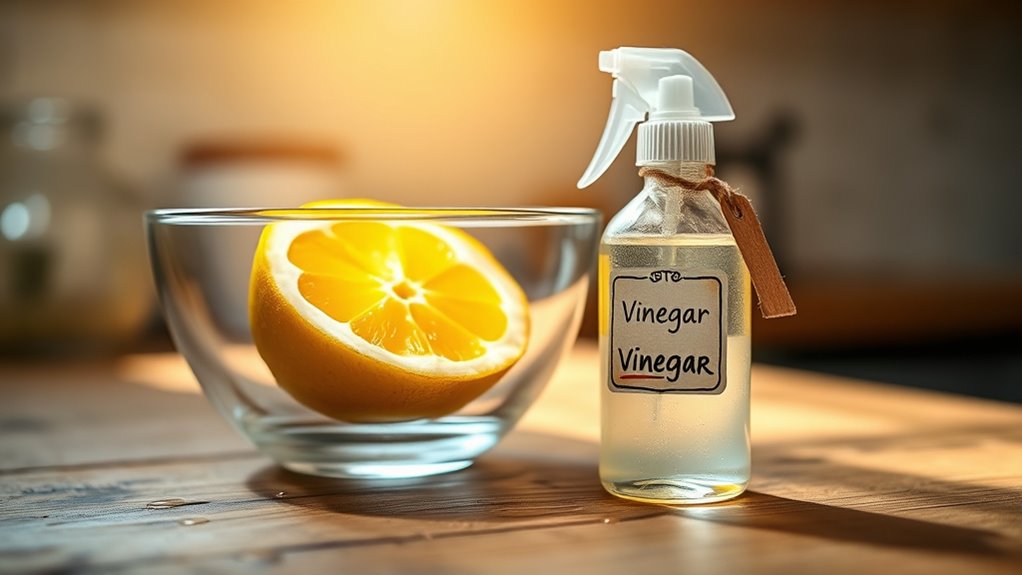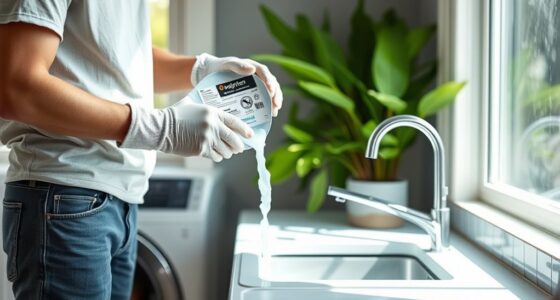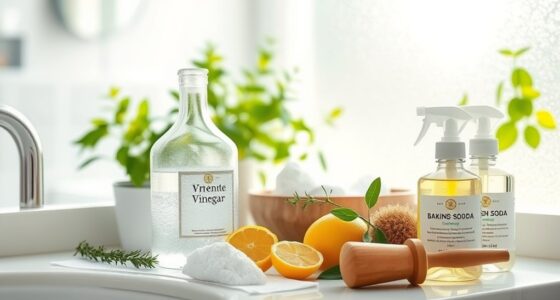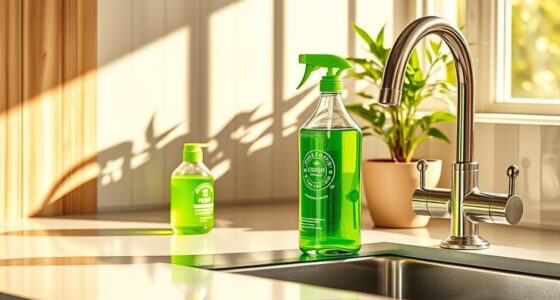Vinegar and lemon are popular natural cleaners, but their ability to truly kill germs is limited. Vinegar contains acetic acid that reduces bacteria and mold, while lemon’s citric acid offers some antimicrobial benefits. However, neither is a registered disinfectant and they don’t reliably eliminate all pathogens like bacteria, viruses, or mold. For thorough disinfection, use EPA-approved products. If you want to learn more about natural approaches and their limitations, keep exploring this topic.
Key Takeaways
- Vinegar and lemon have some antimicrobial properties but do not eliminate all germs effectively.
- Neither vinegar nor lemon are registered disinfectants and shouldn’t replace EPA-approved disinfectants for high-risk cleaning.
- Vinegar can reduce bacteria and mold but isn’t broad-spectrum or fully sterilizing.
- Lemon’s citric acid offers limited antimicrobial effects but is insufficient for thorough disinfection.
- They are useful for routine cleaning and deodorizing but not reliable for complete germ elimination.

Natural disinfectants offer a safe and effective alternative to chemical cleaners for maintaining a clean environment. If you’re interested in DIY cleaning, switching to natural solutions like vinegar and lemon can be appealing because they’re easy to find and inexpensive. You might wonder if these common household ingredients truly work to kill germs and keep your home hygienic. The good news is that vinegar and lemon have properties that can help with cleaning and disinfecting, but it’s essential to understand their capabilities and limitations.
Vinegar, especially white distilled vinegar, contains acetic acid, which has antimicrobial properties. When used in DIY cleaning, vinegar can effectively eliminate some bacteria and mold, making it a popular choice for cleaning kitchen counters, glass, and bathroom surfaces. It’s a chemical alternative that’s free from synthetic additives and fumes, making it safer for your family and the environment. However, vinegar isn’t a broad-spectrum disinfectant, meaning it doesn’t reliably kill all pathogens, like the flu virus or certain bacteria such as Salmonella. Still, it’s excellent for everyday cleaning, removing dirt, grime, and odors, and reducing the overall microbial load.
Vinegar kills some germs but isn’t a broad-spectrum disinfectant for all pathogens.
Lemon, on the other hand, contains citric acid, which also has natural antimicrobial qualities. Its fresh scent makes it a favorite in DIY cleaning recipes, and it can help break down soap scum and hard water stains. Lemon juice can be combined with vinegar or used on its own for cleaning surfaces, and it’s particularly good for deodorizing. But like vinegar, lemon isn’t registered as a disinfectant by health authorities, so it shouldn’t be relied upon solely for sterilizing surfaces in situations where a high level of disinfection is necessary, such as in a household with someone who’s ill.
While both vinegar and lemon serve as useful natural cleaning agents, it’s important to know their limitations. For full disinfection, especially against more resilient germs or viruses, EPA-registered disinfectants are recommended. Nonetheless, if your goal is to reduce chemical exposure and create a safer home environment, these ingredients make great chemical alternatives for regular cleaning tasks. They’re part of a growing trend in DIY cleaning that emphasizes natural, non-toxic solutions. Just remember, for certain situations, combining natural methods with proper disinfectants ensures thorough hygiene. Using vinegar and lemon as part of your routine can help you maintain a clean space without relying solely on harsh chemicals, aligning with your desire for safer, eco-friendly cleaning. Additionally, understanding the credibility of disinfectants and their effectiveness can help you make informed decisions about cleaning products.
Frequently Asked Questions
Are Natural Disinfectants as Effective as Commercial Products?
You might wonder if natural disinfectants can match commercial products‘ antibacterial effectiveness. While natural cleaning options like vinegar and lemon are great for basic cleaning and may reduce some germs, they often don’t provide the same level of antimicrobial power. For thorough disinfection, especially against tough bacteria and viruses, commercial disinfectants are usually more reliable. So, for serious germ control, consider combining natural cleaning with proven disinfectants.
Can Vinegar or Lemon Eliminate All Types of Bacteria?
They say “don’t put all your eggs in one basket,” but when it comes to bacteria elimination, vinegar and lemon aren’t foolproof. While they have natural antimicrobial properties, they don’t eliminate all types of bacteria. Vinegar and lemon can reduce some germs, but for complete disinfection, especially against tougher bacteria, you need stronger, proven disinfectants. Relying solely on natural options might leave you vulnerable to certain bacteria.
How Long Should Natural Disinfectants Sit on Surfaces?
You should let natural disinfectants like vinegar or lemon sit on surfaces for at least 1 to 5 minutes to guarantee effective dwell time and proper surface contact. This allows the acids to break down germs and bacteria effectively. Remember, shorter contact times might not be enough, so it’s best to keep the disinfectant on the surface for the full recommended duration before wiping or rinsing.
Are There Surfaces Where Natural Disinfectants Shouldn’t Be Used?
You should avoid using natural disinfectants like vinegar and lemon on fragile surfaces or porous materials. These substances can cause damage or discoloration, especially on delicate items like hardwood, marble, or certain fabrics. Always test a small, hidden area first. For sensitive surfaces, consider using milder cleaning methods or products specifically designed for those materials, ensuring you disinfect without risking harm.
Do Natural Disinfectants Have Any Health or Safety Risks?
You might wonder if natural disinfectants pose health concerns or safety risks. While they’re generally safer than chemical cleaners, you should still take safety precautions, like avoiding direct contact with concentrated vinegar or lemon juice, which can irritate your skin or eyes. Keep areas well-ventilated when using these substances, and store them out of reach of children. Being cautious guarantees you enjoy their benefits without risking health problems.
Conclusion
Remember, while vinegar and lemon may seem like shining knights against germs, they’re just guides on your journey, not the fortress itself. Relying solely on them is like trusting a candle to light a dark tunnel—it provides some hope but not complete security. True protection comes from understanding their limits and combining natural remedies with proper hygiene. Ultimately, you hold the torch; choose wisely, and let your knowledge be the compass that keeps your home safe and bright.










